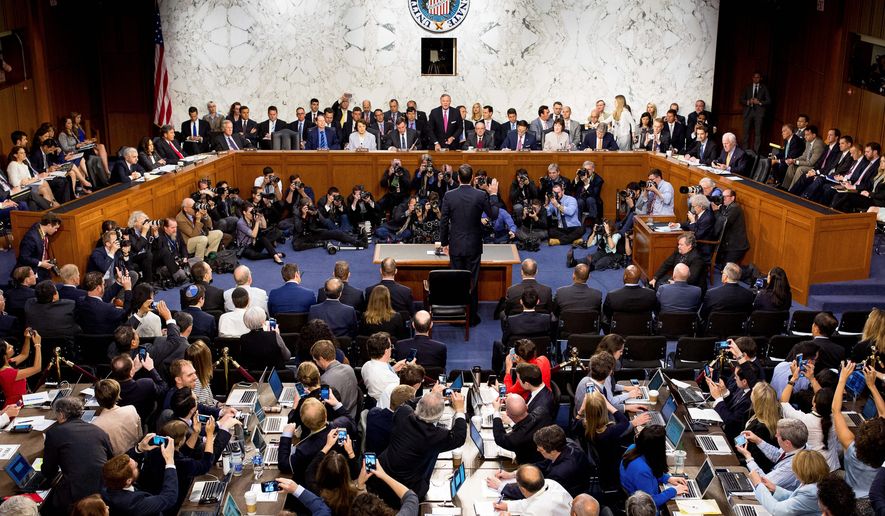It’s not clear that a sitting president could ever be convicted of obstruction of justice, legal experts said, laying out the giant task that would face anyone trying to prosecute a case against President Trump and his interactions with fired FBI Director James B. Comey.
Mr. Comey struggled to make the case himself in testimony Thursday, saying that while he felt pressure, the president never directly ordered him to back off any part of the probe into Russian meddling in the 2016 election.
Lawyers took to television and Twitter to parse Mr. Comey’s revelations and opine on whether they rose to the level of criminal danger to Mr. Trump, in a debate remarkably similar to the one last year over whether Democratic presidential candidate Hillary Clinton broke the law with her emails.
But Congress’ legal arm, the Congressional Research Service, said in a memo last month that making a case against a sitting president would “face unique hurdles.”
The analysts said it’s unclear that a president can even face obstruction of justice charges. The Justice Department for years has held that the sitting president is immune from criminal charges. Courts haven’t weighed in on the subject.
Meanwhile, the statute most likely to apply, Section 1505 of the criminal code, governs those who obstruct administrative proceedings. The CRS said federal courts have “not reached consensus” over whether an FBI investigation rises to the level of a “pending proceeding” for purposes of the law.
“No federal court has plainly held that Section 1505 covers FBI investigations,” the CRS said.
But even beyond definitions, the CRS said, prosecutors would have to prove intent.
“Evidence that a sitting president did, in fact, hinder an FBI investigation would not be enough; prosecutors would also face the potentially difficult task of establishing the purpose behind a president’s actions,” the legal analysis concluded in the May 19 memo, which examined Mr. Comey’s claims, based on leaks he orchestrated to The New York Times.
Mr. Comey expanded on those claims in Thursday’s hearing, saying that while Mr. Trump did not actually end up hindering his probe, the former director said he considered the president’s actions an attempt to exert pressure.
Mr. Comey at one point said he didn’t know “for sure” why he was fired, but later was more definitive, saying he was “fired in some way to change, or the endeavor was to change the way the Russia investigation was being conducted.”
Whether that amounts to obstruction of justice he said he’d leave for newly minted special counsel, Robert F. Mueller, who’s now heading the Russia investigation.
“I don’t think it’s for me to say whether the conversation I had with the president was an effort to obstruct. I took it as a very disturbing thing, very concerning, but that’s a conclusion I’m sure the special counsel will work toward, to try and understand what the intention was there, and whether that’s an offense,” Mr. Comey testified.
Mr. Comey said Mr. Trump’s exact statement to him was that he “hoped” the FBI would drop its probe into former National Security Adviser Michael Flynn. The FBI director said that while Mr. Trump did not order him to drop the investigation, “I took it as a direction.”
“You may take it as a direction, but that’s not what he said,” countered Sen. James E. Risch, Idaho Republican.
“Correct,” Mr. Comey concurred.
“Do you know of anyone that’s ever been charged for hoping something?” Mr. Risch said.
“I don’t, as I sit here,” Mr. Comey said.
Politicians and pundits rushed to dissect Mr. Comey’s testimony and what it means for Mr. Trump’s legal jeopardy.
Anthony D. Romero, executive director of the American Civil Liberties Union, said Mr. Comey’s sense that Mr. Trump was trying to set up a “patronage” relationship — allowing the director to keep his job, in exchange for owing Mr. Trump — could be the basis for an obstruction case.
“Trying to set up a quid pro quo arrangement with the FBI director would certainly establish an intent to obstruct justice,” Mr. Romero said in his analysis of the hearing.
In Congress, Rep. Al Green said the matter was clear enough to deserve ouster from office.
“The president has obstructed justice, and the president should be impeached,” said the Texas Democrat, who is already drawing up articles of impeachment.
But Donald Trump Jr., the president’s son, took to Twitter to say that the exchange was “Very far from any kind of coercion or influence and certainly not obstruction!”
“Knowing my father for 39 years when he ’orders or tells’ you to do something there is no ambiguity, you will know exactly what he means,” the younger Mr. Trump tweeted.
• Stephen Dinan can be reached at sdinan@washingtontimes.com.




Please read our comment policy before commenting.